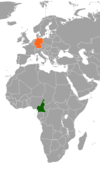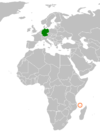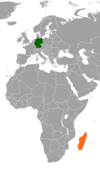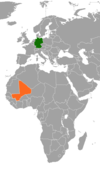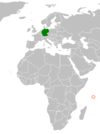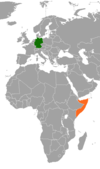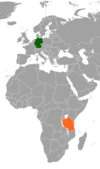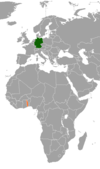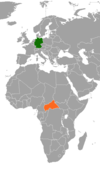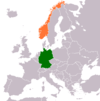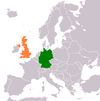Foreign policy of the Federal Republic of Germany

In terms of foreign policy , the Federal Republic of Germany pursues interests and goals that are derived from geographic, historical, cultural and global political conditions. In the first two decades of the Federal Republic's existence, the foreign policy of the government in Bonn was entirely geared towards regaining sovereignty and state unity by adopting all the regulations necessary to fulfill the reunification requirement; this was in tension with the political will of the German Democratic Republic and the occupying power of the Soviet Union . The German government subordinated all other interests to achieving this goal , and integration into the EEC and NATO are ultimately to be seen as a means of achieving reunification.
It was only after Bonn realized in the second half of the 1960s that unification with the GDR could at best be achieved in the long term and that the Federal Republic, with the Eastern Treaty in the years 1970 to 1973, expressly considered the inter-allied borders after the Second World War to be legally binding as well as confirmed their inviolability, the foreign policy of the Federal Republic could set new priorities. This primarily included the further advancement of European integration and the promotion of foreign trade interests, but later also goals such as the global enforcement of human rights and environmental protection.
Since 1990, German foreign policy has made greater efforts to gain political influence in multilateral decision-making processes such as those of the United Nations , the OSCE , the European Union and the G20, commensurate with the amount of funding they hold in these organizations. In addition, the range of German foreign policy instruments has been expanded since the end of the 1990s to include foreign deployments of the Bundeswehr .
Foreign policy was and is significantly shaped by the respective foreign ministers of the respective government coalitions (1949–1966: black-yellow ; 1966–1969: grand coalition ; 1969–1982: social-liberal coalition ; 1982–1998: black-yellow; 1998–2005: red -Green ; 2005–2009: Grand Coalition; 2009–2013: Black-Yellow; from 2013: Grand Coalition). The foreign minister was mostly a member of the smaller coalition party and had usually been vice chancellor since 1966 .
Normative requirements for German foreign policy
Requirements of the Basic Law
Preservation of the peace and prohibition of aggressive war
The German Basic Law expresses itself in four different places on the preservation of peace. The preamble already says that the German people are inspired by the will to “serve the peace of the world”. Immediately thereafter in Article 1 of the Basic Law, Paragraph 2, it is further stated that human rights should apply as the basis of peace. According to Art. 26, Paragraph 1, Sentence 1 of the Basic Law, acts are unconstitutional "which are suitable and are undertaken with the intention of disturbing the peaceful coexistence of peoples, in particular to prepare for the conduct of a war of aggression". The fourth section of the Basic Law is Article 24 (2) of the Basic Law, which allows the Federal Republic to join a system of collective security if this serves to “maintain peace”, to “create a peaceful and lasting order in Europe and between to bring about and secure the peoples of the world ”.
In order to join such a system, the membership of the Federal Republic of Germany in the UN as a system of collective security obviously corresponds without any problems with Article 24.2 of the Basic Law. However, even memberships in NATO and WEU are included as systems of collective defense , because the principles contained therein are also fulfilled if the alliances are strictly committed to maintaining peace. According to constitutional law, this is the case with NATO and WEU.
Willingness to cooperate internationalism
The Basic Law also explains in the preamble that the German people express their will to "serve the peace of the world as an equal member in a united Europe". Art. 24 GG also enables sovereign powers to be transferred to intergovernmental institutions. Paragraph 3 is even an invitation to join an international dispute settlement system. The Basic Law thus actively encourages the international integration of the Federal Republic.
Respect and realization of human rights
According to Art. 1 GG, the German people are committed to upholding human rights as one of the foundations of peace. Since peace under the Basic Law according to prevailing opinion means only the absence of war, and not a broader definition of such. B. social peace, Art. 1 GG can be interpreted as a call not only to implement human rights domestically, but also to promote them externally.
International law obligations
According to Art. 25 GG, Germany submits to international law . It is noteworthy that the Federal Republic also recognizes international law as directly in the internal legal area and does not assume a duality of national and international law, as other states do.
Furthermore, the Federal Republic of Germany renounces atomic, biological and chemical weapons ( ABC weapons ). In the course of joining NATO and the WEU, it was Konrad Adenauer's own decision to voluntarily renounce NBC weapons. However, this waiver initially only related to the manufacture of this type of weapon within the Federal Republic. Only later, with the signing of the Nuclear Non-Proliferation Treaty in 1969, did the renunciation also apply to possession and control of nuclear weapons. With the two-plus-four treaty in the course of reunification, the Federal Republic confirmed this waiver.
Institutions and Actors in German Foreign Policy
Federal government
Within the federal government , the Foreign Office , the Federal Ministry for Economic Cooperation and Development and the Federal Ministry of Defense are primarily active in foreign policy. However, since there are hardly any political areas today in which no international coordination takes place, practically all other federal ministries also have foreign policy contacts. The Federal Government's Rules of Procedure (GOBReg) assign the Federal Foreign Office a coordinating function. According to Section 11 of the GOBReg, other ministries may only receive foreign guests after consulting the Foreign Office and conduct international negotiations only with the approval of the Office. In addition, the Federal Chancellery is always informed about the foreign policy activities of the individual departments via its corresponding mirror presentations and can act in a coordinating manner.
German Bundestag
The German Bundestag primarily has the role of overseeing the federal government's foreign policy. This control takes place first and foremost in the relevant specialist committees, above all the Foreign Affairs Committee . According to Article 59 of the Basic Law, the Bundestag's approval for international treaties is required; the Bundesrat must also be involved in this, if a treaty affects the competences of the states.
Non-governmental organizations
In Germany, a number of non-governmental organizations deal in various ways with issues of foreign policy and the foreign relations of the Federal Republic. These organizations can be pure think tanks such as the German Society for Foreign Policy , lobbying groups for special topics such as Amnesty International or organizations to promote bilateral relations between Germany and other states (e.g. the Atlantik-Brücke ) . The organizations' working methods and resources vary widely, but what most have in common is that they try to provide policymakers with alternative sources of information in the field of foreign policy and try to influence public opinion in their favor.
history
Western integration
The first years after the end of the Second World War were marked by the loss of sovereignty and statehood, from which the only way out was cooperation with the Allies . To combat the need, the Americans provided reconstruction aid for the coal and steel industries as part of the Marshall Plan from 1947 . After the currency reform prepared by the Americans in 1948 , reconstruction could begin. In 1948 the London Six Power Conference urged the establishment of a West German state. The Berlin blockade by the Soviet occupying forces lasted from June 1948 to May 12, 1949 , against which an airlift was set up by the Western powers to supply the city's population with food and coal. After the Western Allies had asked the Germans to draft a constitution , the Prime Ministers of the states met in the Trizone first in the Rittersturz Conference and then the Constitutional Convention . As a result, the Federal Republic of Germany was founded in 1949 .
To this end, the western part of Germany was reorganized under constitutional law , the Basic Law of May 23, 1949, was given scope for decision-making in national politics, and German participation was discussed when NATO was founded on April 4, 1949 in Washington . In addition, the foreign military governors became high commissioners . As part of the agreement, the Occupation Statute was published on September 21, 1949 to control disarmament , demilitarization , foreign policy, foreign trade , foreign exchange and the application of the Basic Law . In the Petersberg Agreement of November 22, 1949, the Allies reserved consular relations , dismantling and decisions about Germany's accession to international organizations. On October 24, 1950, France proposed a European Defense Community to prevent the creation of a German army, but could not prevail. In October of the same year, the Blank office was created in the Federal Chancellery to prepare for rearmament . On March 15, 1951, the incumbent Federal Chancellor Konrad Adenauer took over the post of Foreign Minister .
Only one month later, on April 18, 1951, the ECSC became the basis for the basic industry ( coal and steel union ); international control over the Ruhr area was lifted. The Federal Border Guard was also created in 1951 , from which half of the officers joined the Bundeswehr in 1956. In 1952, the consequences of the Second World War are mainly dealt with: the Luxembourg Agreement with Israel of September 10th provided for DM 3 billion for the integration of 500,000 refugees; Adenauer saw in these agreements an improvement in Germany's moral position in the world. Finally, international relations were promoted through membership in the UNHCR and a dedicated mission to the United Nations in New York . This was supported by the London Debt Agreement of February 27, 1953, which created the prerequisites for German creditworthiness and thus for international business and foreign trade.
Sovereignty and the Hallstein Doctrine
The Federal Republic was able to abandon its status as an occupied country when it joined NATO in 1955. Ambassadors from allied states were formed from the Allied High Commissioners and, in 1956, the Bundeswehr was founded as an army within NATO.
In 1957, the Federal Republic of Germany, together with France , Italy and the Benelux countries, signed the Treaty of Rome establishing the European Economic Community (EEC), from which the European Union would later emerge.
In 1957 and 1961, the Federal Republic of Germany founded two organizations to support groups in need, the Association of Displaced Persons , which represents twelve million refugees, and the Federal Ministry for Economic Cooperation and Development , in order to show its practical commitment to the world.
Relations were also sought to the east. Adenauer visited Moscow at the beginning of September 1955 to establish diplomatic relations with the USSR. The main negotiations were the release and “ return of the ten thousand ”; they dealt with the repatriation of 2 of the 3.3 million German prisoners of war . The way to establishing diplomatic relations with the other Eastern Bloc countries was blocked by the dogma of the Hallstein Doctrine .
With the Franco-German reconciliation , which was pushed forward against strong opposition, and the partnership agreed in the Élysée Treaty of January 22, 1963, Konrad Adenauer gave German foreign policy a second pillar in order to compensate for the imbalances in the transatlantic relationship that had been felt since the building of the Wall. The second Chancellor Ludwig Erhard's lack of understanding of this construction led to a dispute between the so-called Atlanticists and Gaullists after Adenauer's resignation .
From Ostpolitik to reunification
After the Hallstein Doctrine was tacitly abandoned by the grand coalition , the next step from 1969 onwards was the compromise with Poland , Czechoslovakia and other countries under the control of the USSR. The Eastern Treaties with the USSR (August 12, 1970) and Poland (December 7, 1970) concluded important agreements on relations with the formerly occupied neighboring countries.
The leeway created in this way in the European dialogue was then used to put the relationship with the German Democratic Republic on a new basis. First, on September 3, 1971, the quadripartite agreement concluded on Germany and Berlin, which was to clarify the status of Berlin, then on 21 December 1972 of the basic treaty , which the GDR a transit for West Berlin guaranteed.
The years 1973 and 1975 were then mainly devoted to other international relations. The Federal Republic of Germany was present at the opening of the Conference on Security and Cooperation in Europe (CSCE) in Helsinki on July 3, 1973, and on September 18 of the same year was able to obtain full UN membership with the GDR. The Final Act of Helsinki of August 1, 1975 finally opened up greater scope for German foreign policy to strive for good neighborly relations with the Eastern European states and thus to reduce the existing resistance to the reunification of Germany.
Situation since 1989/1990

The regaining of full sovereignty through the two-plus-four treaty and the associated reunification of Germany - on October 3, 1990, the reunification requirement was regarded as fulfilled and, together with Art. 23 GG old version - marked the beginning of one renewed change in German foreign policy. After the collapse of the Soviet Union and the end of the bipolar power structure in the world, Germany was no longer existentially threatened. Under Chancellors Helmut Kohl and Gerhard Schröder, the goals of German foreign policy were adapted to a changed global political situation and steps were taken that marked a clear departure from old principles.
On the question of European unification, the course that had been taken before the fall of the Wall was maintained and strengthened in many places. Germany established itself as a clear advocate of the EU's eastward expansion and increasingly took sides for the Eastern European states as well as for Russia , which of course was due to the very friendly relations between Yeltsin / Kohl and Putin / Schröder. Further cornerstones of EU policy after reunification were the introduction of the euro as a common currency (from January 1, 2002) and the creation of an EU constitution . Has become in terms of the past few years can be said that the foreign policy of the German government in EU matters mainly more to the EU's internal policy, because the European Union is engaged more and more dense in the foreign policy of its member countries and the common foreign and security policy ever operated more strongly.
However, a novelty in foreign policy since 1945 has always been the abandonment of “ checkbook diplomacy ”, that is, the mere financial support of military conflicts such as in the Second Gulf War . In this regard, one speaks of a change in Germany from a security importer to a security exporter . Although slogans such as “No blood for oil” characterized the apparently unanimous opinion in the Gulf War mentioned above, the Bundeswehr took part in a so-called “out-of-area” mission in Somalia for the first time in mid-1993 and thus decided to withdraw from a defense army to transform into an international reaction force. Another step was taken in 1999 when the German armed forces took part in air strikes on Serbia . This represented a preventive strike to avert a humanitarian catastrophe in Kosovo and was highly controversial under international law . Even after September 11, 2001, the Germans took part in " Operation Enduring Freedom " in Afghanistan, after NATO had previously declared an alliance for the first time in its history . Today all parties (with the exception of the left ) are behind the Bundeswehr's missions abroad; In the run-up to such a measure, the committees discussed heatedly in some cases until the necessary approval from the Bundestag was finally obtained.
A change of course in German foreign policy was also reflected in the cooling of transatlantic relations compared to the times of the Cold War. Even during Helmut Kohl's term in office, there were increasing references to German criticisms such as the use of the death penalty or non-participation in the Kyoto Protocol on environmental protection. The German-American relationship experienced an absolute low point during the Iraq conflict 2002–2003, when Chancellor Schröder rejected a military intervention in mid-2002, perhaps for reasons of election tactics, and thus blindly rejected a decision by the UN Security Council and the UN General Assembly anticipation. In this situation, the Franco-German partnership once again demonstrated its importance as a second pillar of German foreign policy.
Still under Schröder and since 2005 under Chancellor Angela Merkel , the transatlantic relationship has brightened up again, especially since Barack Obama became US President after the 2008 presidential elections.
The transatlantic relationship deteriorated again as a result of the NSA affair in 2013 .
Multilateral engagement
Germany is a member of many international organizations. The Federal Republic not only supports these organizations financially, but also actively participates in the development of their strategies, the design of their programs and the implementation of their goals.
UN membership
The Federal Republic of Germany became a full member of the United Nations on September 18, 1973 .
Before that, the Federal Republic of Germany had acquired full membership of the Food and Agriculture Organization (FAO) in 1950 and, in the following years, of all other specialized organizations. Since October 3, 1990, the united Germany has been a member of the world organization and the entire “ United Nations system ” under the name “Germany” . Today the Federal Republic is striving for a permanent seat in a reformed World Security Council.
In 2019 and 2020, Germany is a non-permanent member of the United Nations Security Council for the sixth time . In July 2020, after April 2019, Germany will again chair the most important body of the UN . In addition to dealing with current crises in Syria, Yemen and Libya, Germany is setting its own priorities: the topics of global health, climate and security, human rights and sexual violence in conflicts, but also combating the effects of the COVID-19 pandemic are on the agenda.
Bilateral relations
Africa
America
Asia
Australia and Oceania
| Country | Beginning of official relations | Remarks | map |
|---|---|---|---|
|
|
→ Main article: Australian-German relations | ||
|
|
→ Main article: Relations between the Cook Islands and Germany | ||
|
|
→ Main article: German-Fijian relations | ||
|
|
→ Main article: German-Kiribati relations | ||
|
|
→ Main article: German-Marshal relations | ||
|
|
→ Main article: German-Micronesian relations | ||
|
|
→ Main article: German-Nauruan relations | ||
|
|
→ Main article: German-New Zealand relations | ||
|
|
1997 | ||
|
|
→ Main article: German-Papua-New Guinean relations | ||
|
|
→ Main article: Relations between Germany and the Solomon Islands | ||
|
|
→ Main article: German-Samoan relations | ||
|
|
|||
|
|
→ Main article: German-Tuvaluan relations | ||
|
|
→ Main article: German-Vanuatu relations |
Europe
| Country | Beginning of official relations | Remarks | map |
|---|---|---|---|
|
|
|||
|
|
|||
|
|
November 1992 | ||
|
|
|||
|
|
|||
|
|
July 9, 1921 and again August 28, 1991 | ||
|
|
January 4, 1918 | ||
|
|
|||
|
|
1834 (Prussia) | ||
|
|
1922 | ||
|
|
|||
|
|
|||
|
|
December 31, 1991 | ||
|
|
February 20, 2008 | ||
|
|
January 15, 1992 | ||
|
|
July 15, 1920 and again August 28, 1991 | ||
|
|
|||
|
|
1918 and again in 1991 | ||
|
|
|||
|
|
1965 | ||
|
|
April 30, 1992 | ||
|
|
|||
|
|
|||
|
|
|||
|
|
|||
|
|
|||
|
|
|||
|
|
|||
|
|
|||
|
|
February 20, 1880 or with the BR Dtld. January 31, 1967 | → Main article: German-Romanian relations | |
|
|
|||
|
|
→ Main article: German-San-Marine relations
|
||
|
|
→ Main article: German-Swedish relations | ||
|
|
→ Main article: German-Swiss relations
|
||
|
|
December 11, 1951 (to Yugoslavia) | → Main article: German-Serbian relations | |
|
|
1993 | → Main article: German-Slovak relations
|
|
|
|
January 15, 1992 | → Main article: German-Slovenian relations
|
|
|
|
→ Main article: German-Spanish relations
|
||
|
|
|||
|
|
|||
|
|
|||
|
|
December 21, 1973 | ||
|
|
|||
|
|
→ Main article: German-British relations | ||
|
|
1999 | → Main article: German-Belarusian relations
|
|
|
|
Former states
| Country | Duration of the official relationship | Remarks | location | map |
|---|---|---|---|---|
|
|
1972-1990 | Europe |
See also
- Foreign service
- Ambassador of the Federal Republic of Germany
- Western integration
- New Ostpolitik
- Germany's international treaties
- German Society for Foreign Policy
- League for Friendship of Peoples
- List of diplomatic missions in Germany
- List of Germany's intergovernmental agreements
literature
Introductions:
- Wolfram Hilz: German foreign policy . Kohlhammer, Stuttgart 2017. ISBN 978-3-17-028925-3 .
- Stephan Bierling: The foreign policy of the Federal Republic of Germany. Norms, actors, decisions. Oldenbourg Wissenschaftsverlag , Munich 2005, ISBN 3-486-57766-2 .
- Wilfried von Bredow : The foreign policy of the Federal Republic of Germany. An introduction (= textbooks foreign policy and international relations textbook ). 2nd edition, VS Verlag für Sozialwissenschaften, Wiesbaden 2008, ISBN 978-3-531-16159-4 .
- Lars Colschen: German Foreign Policy. Wilhelm Fink, Paderborn 2010, ISBN 978-3-7705-4709-8 .
- Sven Bernhard Gareis : Germany's foreign and security policy. An introduction . 2nd edition, Budrich (UTB), Opladen u. a. 2006, ISBN 978-3-8252-2843-9 .
- Gunther Hellmann : German foreign policy. An introduction . VS Verlag, Wiesbaden 2006, ISBN 3-531-14906-7 .
- German foreign policy , information on political education 304 (2009).
- Thomas Jäger , Alexander Höse, Kai Oppermann (eds.): German foreign policy. Security, Welfare, Institutions and Norms . 2nd, updated and expanded edition, VS Verlag, Wiesbaden 2011, ISBN 978-3-531-17893-6 .
- Siegmar Schmidt, Gunther Hellmann, Reinhard Wolf (ed.): Handbook on German foreign policy. VS Verlag, Wiesbaden 2007, ISBN 978-3-531-13652-3 .
History:
- Stefan Creuzberger: West Integration and New Ostpolitik. The foreign policy of the Bonn Republic. be.bra Verlag, Berlin 2009, ISBN 978-3-89809-414-6 (German history in the 20th century, vol. 14).
- Christian Hacke : The Foreign Policy of the Federal Republic of Germany. From Konrad Adenauer to Gerhard Schröder (= Ullstein . 36391). With a foreword by Gordon A. Craig , Ullstein, Berlin 2003, ISBN 3-548-36391-1 .
- Wolfram F. Hanrieder , Hans Rühle (Hrsg.): In the field of tension of world politics. 30 Years of German Foreign Policy (1949–1979) (= Political Studies . Vol. 6). Verlag Bonn Aktuell, Stuttgart 1981, ISBN 3-87959-121-0 .
- Peter Hünseler : The foreign policy relations of the Federal Republic of Germany to the Arab states from 1949–1980 (= European university publications . Series 31, Politics. Vol. 143). Lang, Frankfurt am Main a. a. 1990, ISBN 3-631-40837-4 .
- Ulrich Lappenküper : The foreign policy of the Federal Republic of Germany 1949 to 1990. Oldenbourg Wissenschaftsverlag, Munich 2008, ISBN 978-3-486-55039-9 ( Encyclopedia of German History , 83).
- Gregor Schöllgen : The foreign policy of the Federal Republic of Germany. From the beginning to the present . 3rd edition, CH Beck, Munich 2004, ISBN 3-406-51093-0 .
- Hans-Peter Schwarz (Ed.): Handbook on German Foreign Policy , 1975. ( Review ; PDF; 54 kB)
Sources: There is an extensive edition of files on the foreign policy of the Federal Republic of Germany, 19xx . It is published by Oldenbourg Wissenschaftsverlag. Examples:
-
Files on the Foreign Policy of the Federal Republic of Germany
- Vol. 2: Adenauer and the High Commissioners 1952. ISBN 978-3-486-55201-0 (1st edition 1952);
- Vol. 1: The year 1952 (1st edition 2000).
- Files on the Foreign Policy of the Federal Republic of Germany, 1982 (1 volume), ISBN 978-3-486-71876-8 (1st edition 2013).
Web links
Institutions:
- Official website of the Federal Foreign Office
- Official website of the German Society for Foreign Policy
Press and publications:
- Volker Rittberger: Between Power Politics and Norm Politics , Zeit Online , February 26, 2002
- Constanze Stelzenmüller : The self-tied republic , in: Internationale Politik , March / April 2010
- Gemma Pörzgen: "The Russia Competence in the German Bundestag", in: Russia Analysis No. 188 (PDF; 487 kB)
- Position paper , SWP conference , autumn 2013, with 50 participants from the establishment, including Thomas Bagger and Arndt Freiherr Freytag von Loringhoven as secret service agents.
Others
- FAZ January 2, 2013: Review of the dissertation The Foreign Policy Reason of State of the Federal Republic of Germany: Theoretical Foundations and Political Science Discourse (Thesis: The Federal Republic continues to have fundamental reservations about the use of military force and is therefore still far from redefining German foreign policy in this sense to make.)
Individual evidence
- ↑ Werner Kilian: The Hallstein Doctrine - The diplomatic war between the FRG and the GDR. Duncker & Humblot, Berlin 2001, ISBN 3-428-10371-8 , pp. 22-25.
- ↑ "With the reunification and the German-Polish border treaty of November 14, 1990, the demarcation recognized in the Görlitz Agreement was finally confirmed." Quoted from the Görlitz Agreement. Görlitz / Zgorzelec, July 6, 1950: The Oder-Neisse Line , website of the Federal Foreign Office, November 16, 2009.
- ↑ Philipp Rock: Power, Markets and Morals - On the role of human rights in the foreign policy of the Federal Republic of Germany in the sixties and seventies. Peter Lang, Frankfurt a. M. 2010, ISBN 978-3-631-59705-7 , p. 270.
- ↑ The Federal Constitutional Court constructs a legal obligation with regard to active participation in peace policy (cf. BVerfGE 5, 85 [127] and BVerfGE 36, 1 [17]). For example Martina Haedrich , Friedensgebot und Grundgesetz , in: Hans J. Gießmann, Bernhard Rinke (Ed.): Handbuch Frieden , 1st edition, VS Verlag, Wiesbaden 2011, p. 340 fn. 5.
- ↑ Alexander Siedschlag: The active participation of Germany in military actions for the realization of collective security. Frankfurt a. M. [u. a.] 1995.
- ^ Gunther Hellmann: German foreign policy. An introduction. 2006, p. 16.
- ^ Gunther Hellmann: German foreign policy. An introduction. 2006, p. 19.
- ^ Gero Erdmann: Churches and NGOs. In: Siegmar Schmidt, Gunther Hellmann, Reinhard Wolf (eds.): Handbook on German Foreign Policy , VS Verlag für Sozialwissenschaften, Wiesbaden 2007, ISBN 978-3-531-13652-3 , pp. 303-312, here pp. 311 f .
- ^ Petersberg Agreement. Bonn, November 22, 1949: A chance for the young Federal Republic , Auswaertiges-amt.de, November 16, 2009.
- ↑ Federal Agency for Civic Education: 45 years ago: Admission of the two German states to the UN | bpb. Retrieved July 2, 2020 .
- ↑ Foreign policy of the Federal Republic of Germany . In: Wikipedia . June 25, 2020 ( wikipedia.org [accessed July 2, 2020]).
- ↑ Hoffmann, Bert; ifa (Institute for Foreign Relations) (Ed.): Change and Approach: Perspectives of German-Cuban Relations in Culture and Education. Stuttgart, 2016 (ifa edition culture and foreign policy). ISBN 978-3-921970-50-8 . URN: http://nbn-resolving.de/urn:nbn:de:0168-ssoar-51123-5
- ↑ Files on the foreign policy of the Federal Republic of Germany: January 1 to June 30, 1976, Volume 1
- ↑ Diplomatic Relations of Romania (English) . Romania, Ministry of Foreign Affairs. Retrieved November 6, 2011.
- ↑ Brief History of Political Relations . Embassy of Romania, Berlin. Retrieved November 12, 2012.
- ↑ Representations in San Marino . Ministry of Foreign Affairs. Retrieved January 6, 2012.
- ^ German representations . Ministry of Foreign Affairs. Retrieved January 6, 2012.
- ↑ Embassy Berlin . Federal Department of Foreign Affairs. Retrieved January 6, 2012.
- ^ German Embassy in Bern (German and French) . Retrieved January 6, 2012.
- ^ Friederike Baer: Between reference and delimitation. The GDR's Yugoslavia policy from 1946 to 1968. Böhlau, Köln / Weimar / Wien 2009, p. 78 .
- ^ Embassy of the Slovak Republic in Berlin (German and Slovak) . Retrieved January 6, 2012.
- ^ Embassy of the Federal Republic of Germany Pressburg (German and Slovak) . Archived from the original on January 17, 2012. Info: The archive link was automatically inserted and not yet checked. Please check the original and archive link according to the instructions and then remove this notice. Retrieved January 6, 2012.
- ↑ Welcome to the website of the Embassy of the Republic of Slovenia in Berlin (German, English and Slovenian) . Retrieved January 6, 2012.
- ↑ German Embassy Ljubljana (German and Slovenian) . Archived from the original on January 14, 2012. Info: The archive link was inserted automatically and has not yet been checked. Please check the original and archive link according to the instructions and then remove this notice. Retrieved January 6, 2012.
- ↑ Embajada de España en Berlin (German and Spanish) . Ministerio de Asuntos Exteriores y de Cooperación. Archived from the original on January 8, 2012. Info: The archive link was automatically inserted and not yet checked. Please check the original and archive link according to the instructions and then remove this notice. Retrieved January 6, 2012.
- ^ Witaj k nam at the German Embassy in Madrid (German and Spanish) . Retrieved January 6, 2012.
- ^ Embassy of the Republic of Belarus in the Federal Republic of Germany (German and Russian) . Archived from the original on October 19, 2012. Info: The archive link was automatically inserted and has not yet been checked. Please check the original and archive link according to the instructions and then remove this notice. Retrieved November 12, 2012.
- ^ Embassy of the Federal Republic of Germany Minsk (German, Russian and Belarusian) . Archived from the original on November 21, 2011. Info: The archive link was inserted automatically and has not yet been checked. Please check the original and archive link according to the instructions and then remove this notice. Retrieved November 6, 2011.
- ↑ Review ( PDF; 54 kB)
- ↑ Heads a so-called "work unit in the management area of the Foreign Office" and reports directly to the Federal Minister for Foreign Affairs. The paper calls for a "re-measurement" of international relations in favor of the FRG, that is, more influence of the Germans; one describes oneself here as "creative power in the waiting position", Fritz Fischer called it "reaching for world power" in relation to the empire. The paper supposedly reflects the state of the discussion from November 2012 to September 2013

















